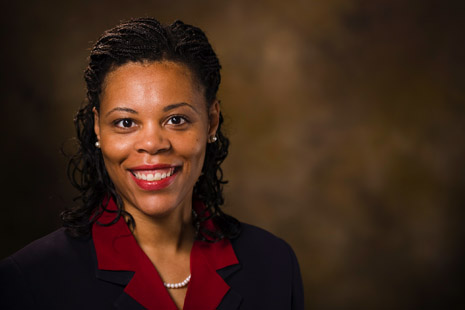FAYETTEVILLE, Ark. – Claims that the United States entered a post-racial era with the election of Barack Obama are premature, according to political scientist Pearl Ford Dowe of the University of Arkansas. Her research shows that stereotypes stigmatizing African Americans and Latinos remain strong.
“According to the Blair-Rockefeller Poll, the presence of the first African American family in the White House has done little to alleviate these attitudes,” Dowe wrote in a recently released report of poll findings titled “Racial Attitudes in America: Post-Racial in the Age of Obama Fails to Exist.” The full report is available at the Blair-Rockefeller Poll website.
Dowe’s analysis of data collected in the poll reveals “a relevant and stark racial divide” in both perceptions of American society and in support for public policies. The data show whites “seem to remain less supportive of policies designed to improve equality, particularly in comparison to African Americans and Latinos,” a reality reflected in the day-to-day experiences reported by African Americans across the country. Of the national sample, 81 percent of African Americans in the South and 80.3 percent of African Americans from elsewhere in the country reported experiencing discrimination in their day to day life.
One aspect of the racial divide is reflected in the widely divergent views of the amount of attention being paid to racial issues in this country. Nationally, 47.2 percent of African Americans and 40.7 percent of Latinos believe that too little attention is being paid to race. In contrast, 56 percent of whites, both Southern and non-Southern, felt too much attention was being paid to race.
This pattern plays out in opinions about the role of the federal government in addressing social issues. The poll asked respondents about the responsibility of the federal government to “make sure that minorities have equality to whites” in several areas, such as jobs, housing and health care. Typically, whites were less supportive than blacks and Latinos of federal intervention. For example, when it comes to ensuring job equality, 73.3 percent of African Americans and 66.2 percent of Latinos felt that it was a responsibility of the federal government, while 68.6 percent of whites felt the federal government should have no such responsibility.
“Will America eventually move to a post-racial society? That is difficult to tell, but what is clear is that different racial perspectives have yet to converge,” Dowe concluded.
Dowe is assistant professor of political science in the J. William Fulbright College of Arts and Sciences at the University of Arkansas.
The Blair-Rockefeller Poll was created by political scientists Todd Shields, Pearl Ford Dowe, Angie Maxwell and Rafael Jimeno of the Diane D. Blair Center of Southern Politics and Society at the University of Arkansas. With over 3,400 respondents, the poll has a national scope as well as ample sampling of such traditionally under-polled groups as African Americans and Latinos. Additionally, by addressing topics that have been little studied, the poll allows researchers to identify socio-cultural influences on political values throughout the country with an emphasis on the South. The Blair Center partners with the Winthrop Rockefeller Institute to produce the Blair-Rockefeller Poll.
The Diane D. Blair Center of Southern Politics and Society was established in 2001 by an act of the U.S. Congress and named in honor of political scientist Diane Divers Blair, who taught for 30 years in the J. William Fulbright College of Arts and Sciences at the University of Arkansas. The center studies the American South from a variety of angles to reveal the undercurrents of politics, history and culture that have shaped the region over time. For more information about the Blair Center, visit blaircenter.uark.edu.
The University of Arkansas System established the Winthrop Rockefeller Institute in 2005 with a grant from the Winthrop Rockefeller Charitable Trust. Based on the legacy and ideas of former Arkansas Gov. Winthrop Rockefeller, this educational institute and conference center offers workshops, seminars, public lectures, conferences and special events. Program areas include agriculture and environment, arts and humanities, economic development, and policy and public affairs. For more information about the Winthrop Rockefeller Institute, visit LiveTheLegacy.org.
Contacts
Pearl K. Ford Dowe, assistant professor, political science
J. William Fulbright College of Arts and Sciences
479-575-6434,
Barbara Jaquish, science and research communications officer
University Relations
479-575-2683,
